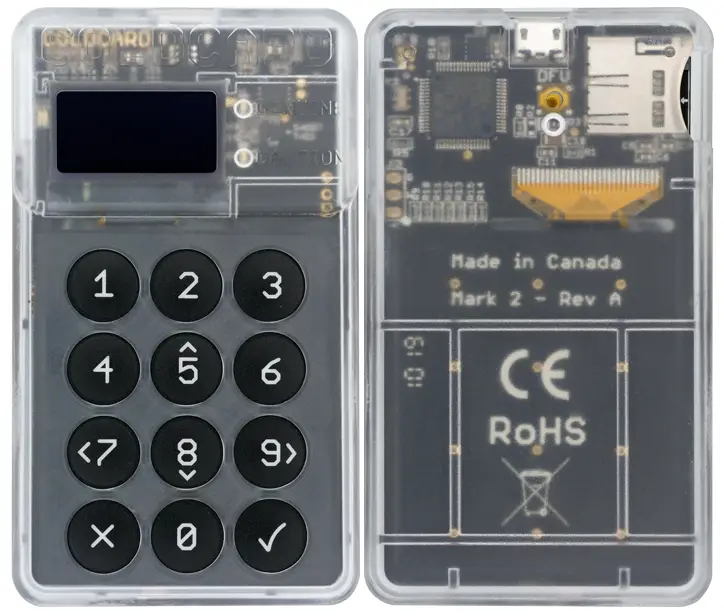A Lightning Node Is A Hot Wallet
We're getting close to the point where we're ready to get more technical and start setting up a node.
But there is something I need to make sure you fully understand, upfront, before we get into this.
When you're dealing with Bitcoin, you need to be security-conscious. You need to careful as to how you store your BTC. Let's go over some different ways to store your Bitcoin.
The safest way to store Bitcoin: Hardware wallets
Hardware wallets take your Bitcoin completely off of your computer, which makes it very, very hard to steal. Actually the greatest risk with a hardware wallet is that you fail to back up your "seed phrase", and then lose the wallet and can't "restore" it. But if you follow best practices, you'll be fine. A couple well-regarded brands include the Cold Card, and the Trezor.

A full discussion of hardware wallets is out of scope for this documentation, but just be aware: Any large amounts of Bitcoin that you have MUST be secured with a hardware wallet. It's not optional. Please don't fuck this up.
A common but unsafe way to store Bitcoin
Many Bitcoin holders insist on storing their Bitcoins the same place they buy them: On centralized exchanges. Everyone tells them not to do this, but they do it anyway.
Some exchanges have gone many years without a hack, but there is always a risk that an insider at the exchange, or a outside hacker, steals your Bitcoin. Once your BTC is stolen from an exchange, you aren't getting them back.

The U.S. Government loves to rescue banks when they run out of money. But they definitely will not rescue a crypto exchange.
Remember FTX? A lot of people stored their Bitcoin at FTX. Turns out it was a fraud and they never had most the Bitcoin in the first place. Fun!
Don't get scammed. You can't trust exchanges to store your Bitcoin.
And not only that: There are a few ethical Bitcoin-only exchanges which actually will try to convince you to withdraw your Bitcoin to self custody.
This is like a bank telling you to withdraw all your money! (Obviously, banks are not ethical, so they would never do this.)
River is an admirable example of an exchange which tries to encourage you to do the right thing. Take their advice: do yourself a favor and custody your own BTC on hardware wallet.
What is a "hot wallet"?
Exchanges are constantly getting hacked because they have to keep at least some of their Bitcoin in something called a "hot wallet". What's that?
Let's first talk about the opposite: a "cold wallet". Hardware wallets are "cold", and that's why they are so secure. Let's say your computer gets hacked, and someone is able to remotely control your computer without your knowledge. If your BTC is in "cold wallet", you're fine, there is no way your BTC can be stolen.
In fact, these hardware wallets are so cleverly designed that even if you plug your wallet into your computer, and your computer is actively compromised (i.e. someone is secretly controlling it from a remote location), your BTC is STILL safe. Amazing, right?
But there is a serious downside to "cold wallets". To actually send BTC, you need to physically touch the hardware wallet and fiddle with the buttons.
That's fine for you, in your house or office, but, a complicated business like a Bitcoin exchange can't keep all of their BTC in a cold wallet. They have hundreds of thousands of users withdrawing and depositing BTC, on a 24/7 basis. They have to allow for AUTOMATED withdrawals and deposits.
To allow for AUTOMATED movement of BTC, you need a "hot wallet", which is a wallet actually running "hot" on a computer, where BTC can be sent out at any second.
A "hot wallet" is a scary thing.
When you're using a hot wallet, if someone walks up to your computer, knows the password to the computer, and knows how to get into your wallet, they can steal all your BTC. In the same way, if someone can get remote access to your computer, they can also steal all your BTC.
A Lightning node is a "hot wallet"
Yep. So keeping BTC on a Lightning node is inherently much more dangerous than keeping BTC in a hardware wallet.
This means you should minimize the amount of BTC you keep on your lightning node.
Now, for many node runners, especially those that are just sending and receiving payments, this will definitely be possible.
So that's why, it's time to ask.... What is going to be the purpose of your Lightning node?